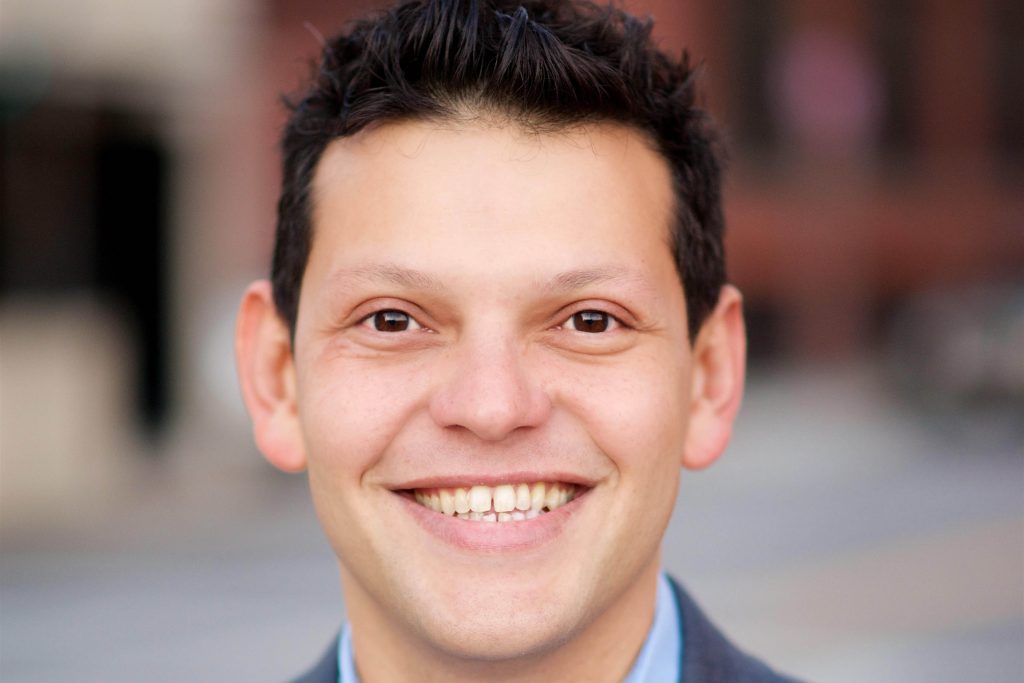The Rappaport Center for Law and Public Policy hosted the Senior Fellow in Residence Community Address September 27 on the topic of pandemic lawyering and the intersection between racial justice and immigrant rights. Iván Espinoza-Madrigal, executive director of Lawyers for Civil Rights, delivered the talk as the most recent senior fellow to join the Rappaport Center.
Espinoza-Madrigal began with reflections on his own upbringing and the struggles he faced having grown up in a low-income immigrant community after moving to the US with his mom and brother at the age of nine. “My journey here was not easy,” he said.
“I didn’t have health insurance until my first job after college. My family didn’t have health insurance until an insurance exchange opened in response to Obamacare. My undocumented family members remain uninsured; they live under the constant threat of immigration enforcement and deportation,” Espinoza-Madrigal said. “I didn’t share a classroom with a white student until seventh grade. For many years I attended what were essentially segregated public schools serving students of color.”
Espinoza-Madrigal had many friends who dropped out of school and eventually came into contact with the criminal justice system. “This was my introduction to the school-to-prison and the school-to-prison-to-deportation pipelines,” he said. “These are just a few examples of life at the intersection of race, immigration, and poverty.”
Lawyers for Civil Rights, which Espinoza-Madrigal leads, is a Boston-based organization founded at the request of President John F. Kennedy at the height of the civil rights movement in 1963 to move the struggle for civil rights from the streets to the courtroom.
“It is really important to think about the overlap between racial discrimination and xenophobia and the way that the experience of immigrants dovetails and intersects with the lived experience of people of color in the United States historically and in the present,” said Espinoza-Madrigal.
He related this to his organization’s efforts to secure the humanitarian release of civil immigration detainees from the Bristol County House of Correction and Jail in Massachusetts, an effort that began with the filing of a class-action lawsuit at the beginning of the pandemic. “Our work in the Bristol County House of Correction was a direct response to alarming reports at the very beginning of the pandemic that detainees were being held with no water, no soap, no sanitizer, no disinfectant, no toilet paper, no masks, and no social distancing at the time,” he explained.
When lawyers started to file individual habeas petitions to secure the release of especially vulnerable individuals, Espinoza-Madrigal saw a flaw in the individual approach.
“It seemed to me that lawyers were essentially picking and choosing who lives or dies, who gets released from overcrowded and life-threatening detention conditions in prison, and who gets to stay there with Covid,” Espinoza-Madrigal noted. “We refused to leave anyone behind. So instead of filing individual habeas petitions, we broke ground filing the Savino case.”
Savino v. Souza was the first coronavirus class action of its kind in the country. Some observers in the legal community warned that the lawsuit was foolish and too much of a risk. According to Espinoza-Madrigal, “they thought it was going to be an uphill battle to get a judge to move on impact litigation issues that are systemic and structural in nature. They didn’t want to risk losing.”
Despite the observers’ warnings, Lawyers for Civil Rights and its allies proceeded with the case. They secured the mass release of detainees from Bristol County. “The people were released regardless of age or underlying medical conditions because they all faced the same risk, the same life-threatening risk of Covid,” said Espinoza-Madrigal. “A facility with a capacity of over 200 people was reduced to seven people through the course of the litigation.”
Word spread quickly, and copycat cases were filed across the country, expressly seeking Savino-like relief. “Ultimately, our class action coupled with sustained community advocacy helped to prompt the Biden-Harris Administration to shut down the Bristol County facility,” said Espinoza-Madrigal.
“Our success in Savino shows that you cannot be afraid of breaking away from the mold. Just because everyone else is filing individual cases doesn’t mean that you have to do the same thing. You cannot be afraid of taking bold action, even against all odds, even against entrenched interests,” he stressed. “We have to approach the law, not through [a] low hanging-fruit lens, but through the lens of survival.”
In conclusion, Espinoza-Madrigal stressed the importance of continuing to join forces to fight for equity, diversity, inclusion, and accessibility. “We all have to be actively anti-racist to dismantle structural racism, and it takes work to be woke. This is work that each of us has to do to save ourselves and each other, to empower ourselves and each other, and to build bridges across differences. We have to dedicate the time to forge alliances and partnerships to build relationships that will build those bridges across communities.”
The essential idea behind the Rappaport’s Senior Fellows in Residence program, as explained by faculty director Daniel Kanstroom, is to engage with a diverse cohort of exciting, successful mid-career professionals who work on cutting-edge issues of law and public policy. “We invite them to come to Boston College for a very intense but brief visit in which we learn from them, and they get to know us—especially our students with whom we hope they will work and develop future professional relationships and possibly research projects,” he said.
View the address on YouTube.


